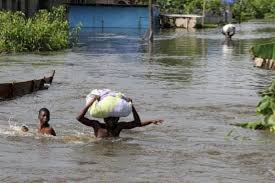
By Chima Nwafo
One Igbo adage translates: A scheduled war does not claim the life of a cripple. But we live in a clime where advance warning makes no difference on any aspect governance. Our leaders prefer to live in denial, especially in the prevailing air of propaganda and the sword of Damocles hanging over the media. That is why even as the coronavirus ravages nationwide, most Nigerians still doubt the figures and even the reality of the pandemic in the country. But they voice their sympathy with the western world. That is part of the credibility rating of the government. But who cares!
Today, the pandemic is wreaking havoc on the populace and the economy for obvious reasons: Health-care system has been neglected for long amid an absence of social networks. The economy was already in recession. There’s little or no manufacturing, which explains the heavy dependence on import. Above all, for some unknown reasons, the system has contempt for Economists.
Long before the advent of the COVID-19 pandemic, there were warnings about poor environmental health, dangers of open defecation, inadequate supply of potable water in urban and rural areas of the country as well as the need for regular hand-washing and personal hygiene. As usual, they were greeted with official pronouncements of monies being allocated and measures being taken: all in words without evidence of performance.
Early in the year, the Director-General of the Nigeria Hydrological Service Agency (NIHSA), Mr Clement Nze, predicted more intense flooding in 2020, as widely reported in the media on February 5. Again, he called on state governments, stakeholders, multi-national companies to construct drainages to prevent flooding across the country. For the umpteenth time, he reminded the public that flooding incidents had led to loss of lives, property, disruption of economic activities and loss of several hectares of agricultural lands across the country.

This has been a recurring decimal since 2010. And tomes have been written in the recent past about the destructive impacts of flooding which lay the foundation for gully erosion. There’s nothing new or strange about flooding – it is a global occurrence. And, given Nigeria’s geographical location, flooding should not be a major concern. But it is; because, like other developmental indices, successive federal and state administrations have not given it a thought.
The failure of public projects and why things are not working in Nigeria could be explained in the words of renowned author and social scientist, Earl B Babbie, who posited:
“We keep linking our understanding of how things are to the picture of ourselves that we present to others. We set things up so that any disproof of these understandings will make us look stupid, gullible, and generally not okay. Whenever we do that, of course, we commit ourselves unwisely to how things are, and create a formidable barrier to further enquiry and more accurate understanding.”

That is the bane of governance in Nigeria. Every administration, political appointee and elected officials assume the status of an all-knowing lord of the manor. And they truly are as evidenced in the recent Audit Report from the office of the Auditor-General of the Federation: “Over N300 billion of public funds are missing, mismanaged, diverted or stolen, as documented in the 2017 audited report by the AGF.”
Yet, they know that information technology has changed the world of communication for good. Nothing can be hidden for too long without public knowledge. Besides, Nigerians are exposed enough to know how things are done elsewhere. We cannot reinvent the wheel. So why don’t our leaders and the political elite borrow ideas rather cash, which they easily misappropriate?
With information from the International Water Association, let’s examine what obtains in other climes: “Europe is at the forefront of the flood control technology. With many countries around Europe at or below the sea level, the problems of floods and rising sea levels are ever-increasing. London is protected from flooding by a huge mechanical barrier across the River Thames, which is raised when the water level reaches a certain point. Venice (Italy) has a similar arrangement, although it is already unable to cope with very high tides. The defences of both London and Venice will be rendered inadequate if sea levels continue to rise.

The largest and most elaborate flood defences can be found in the Netherlands, where they are referred to as Delta Works with the Oosterschelde dam as its crowning achievement. Countries like the Netherlands with projects such as the Zuiderzee Works and the Delta works could prove to be important models for other countries around the world to follow. These sorts of humongous projects could be key in combating the increasing effects of global climate change such as rising sea levels, an increase in the frequency and severity of some natural disasters, and even increased durations of dry or rainy seasons.
America’s New Orleans Metropolitan Area, 35 per cent of which sits below sea level, is protected by hundreds of miles of levees and flood gates. This system failed catastrophically, with numerous breaks, during Hurricane Katrina. The tremendous amount of damage that Katrina did to New Orleans could have been mostly prevented if New Orleans had such an intricate flood control system as the Netherlands. The result of Katrina was that the state of Louisiana sent politicians to the Netherlands to take a tour of the complex and highly developed flood control system in place in the Netherlands.
The Netherlands is the world leader in flood control and has been battling the sea for centuries, and new ways to deal with water are constantly being developed and tested. Projects such as the underground storage of water, storing water in reservoirs in large parking garages, and even something as simple as turning a playground during normal conditions into a small lake during heavy rainfall weather, all show how the Netherlands is actively trying to combat the increasing dangers of rising sea levels. China has recently gone to the Netherlands and requested their help in combating the large scale drought that is occurring around China.”

From the foregoing, Nigerians can see that China knows when and where to go for technical assistance. Even the United States understands interdependence. The tragedy of our circumstance is that even when governments realise the need for expert assistance, officers in charge see it as an opportunity to enrich selves at the expense of the environment. As a result, it’s been impossible for Nigeria to adapt and build resilience in any sector of the economy, despite the multiplicity of funds and technical assistance from the World Bank and developed nations in the last 50 years. That is, aside trillions of dollars earned from oil and gas, without remediation of the oil-producing environment.

Given the appeal to companies by the NIHSA’s director-General, it is timely to cite the example of a project implemented by the National Bank for Agriculture and Rural Development in India. The Bank is reported to have been concentrating on restoration of degraded mangroves, without stating the cost.
This is a challenge to the international oil corporations (IOCs) in the Niger Delta region. However you chose to define corporate social responsibility (CSR), the oil sharks are not doing enough for the oil-producing states. The Nigeria National Petroleum Corporation’s attitude towards the oil-bearing communities can best be described as enjoying benefit without responsibility. Corporate commitment to the Niger Delta is neither favour nor an act of charity. It is rather an appreciation of a community which has given them so much, despite irreplaceable losses.

Besides Chevron, all the IOCs are of European origin; countries that boast vast knowledge and technical knowhow in flood management. The Anglo-Dutch Shell and leading IOC can solely, or in partnership with Total and Agip, assist Bayelsa State in finding a solution to the perennial flood which sacks thousands of people and destroy livelihoods yearly. If a bank could be concerned about restoration of degraded mangrove, one wonders why oil-prospecting companies who contribute immensely to degradation need to be reminded, especially when the requisite technology is at their fingertips.
*Nwafo, Consulting Editor, News Express/ Environmental Analyst, can be reached on: [email protected]; +2348029334754.
Share your story or I Witness Reports with us 24/7 via: SMS: +234 (0)9076248001
Whatsapp: +234(0)8072022024, Email: [email protected], follow us on our social platform. Subscribe to our YouTube @Gatmash TV. Gatmash Blog is one of the most sought- after news portals, with increasing audience, exclusive breaking news and reports across the globe. Plus more. Website: www.gatmash.com
For advert placement, contact us today via email: [email protected] or call our hotlines on Tel: +234(0)9076248001





